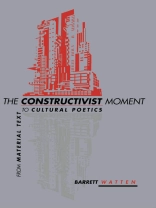<P><B>Winner of the American Comparative Literature Association’s Rene Wellek Prize (2004)</B></P><P>As one of the founding poets and editors of the Language School of poetry and one of its central theorists, Barrett Watten has consistently challenged the boundaries of literature and art. In The Constructivist Moment, he offers a series of theoretically informed and textually sensitive readings that advance a revisionist account of the avant-garde through the methodologies of cultural studies. His major topics include American modernist and postmodern poetics, Soviet constructivist and post-Soviet literature and art, Fordism and Detroit techno—each proposed as exemplary of the social construction of aesthetic and cultural forms. His book is a full-scale attempt to place the linguistic turn of critical theory and the self-reflexive foregrounding of language by the avant-garde since the Russian Formalists in relation to the cultural politics of postcolonial studies, feminism, and race theory. As such, it will provide a crucial revisionist perspective within modernist and avant-garde studies.</P>
Innehållsförteckning
<P>NEW MEANING AND POETIC VOCABULARY: FROM COLERIDGE TO JACKSON MAC LOW<BR>Poetic Vocablary<BR>Coleridge’s Desynonymy<BR>Zukofsky’s Dictionary<BR>Mac Low’s Lexicons<BR>New Meaning<BR>THE SECRET HISTORY OF THE EQUAL SIGN: L=A=N=G=U=A=G=E BETWEEN DISCOURSE AND TEXT<BR>Avant-Garde Paradox<BR>Postrevolutionary Poetics<BR>Legend’s text<BR>Multiauthors (M)<BR>Multiauthors (F)<BR>Multiauthors and the Listserv<BR>THE BRIDE OF THE ASSEMBLY LINE: RADICAL POETICS IN CONSTRUCTION<BR>The Descent<BR>Cultural Poetics<BR>Stein’s Ford<BR>assembling This<BR>The Bride<BR>THE CONSTRUCTIVIST MOMENT: FROM EL LISSITZKY TO DETROIT TECHNO<BR>The Great Divide<BR>Lissitzky’s Examples<BR>Constructivist Poetics<BR>Detroit Techno<BR>Moments<BR>NONNARRATIVE AND THE CONSTRUCTION OF HISTORY: AN ERA OF STAGNATION, THE FALL OF SAIGON<BR>Nonnarrative Poetics<BR>The Construction of History<BR>An era of stagnation<BR>The Fall of Saigon<BR>Nonnarrative Ending<BR>NEGATIVE EXAMPLES: THEORIES OF NEGATIVITY IN THE AVANT-GARDE<BR>Negativity<BR>Dark Matter<BR>The nothing That Is<BR>Limit Situations<BR>Negativities<BR>POST-SOVIET SUBJECTIVITY IN SRKADII DRGOMOSHCHENKO AND ILY KABAKOV<BR>After the Fall<BR>Kabakov’s Kommunalka<BR>Post-Soviet/Postmodern<BR>ZONE: THE POETICS IN POSTURBAN DETROIT<BR>The Postmodern Turn<BR>The object of Spiritual Fantasy<BR>The Modern as Spatial Fantasy<BR>Voundaries as Subject<BR>Social Space and Negativity<BR>Gaps between Terrains<BR>Art and Negativity<BR>Negativity and Social Space<BR>For a critical regionalism<BR>Site and Nonsite<BR>Douglas’s Le Detroit<BR>Posturban Detroit</P>
Om författaren
<P>BARRETT WATTEN is Associate Professor of English at Wayne State University and the author of Total Syntax (1985), essays on avant-garde poetics. He was the editor of This (1971–82) and co-editor of Poetics Journal (1982–98). Recent collections of his literary work include Frame (1971–1990) (1997), Bad History (1998), and, forthcoming, Progress/Under Erasure.</P>












